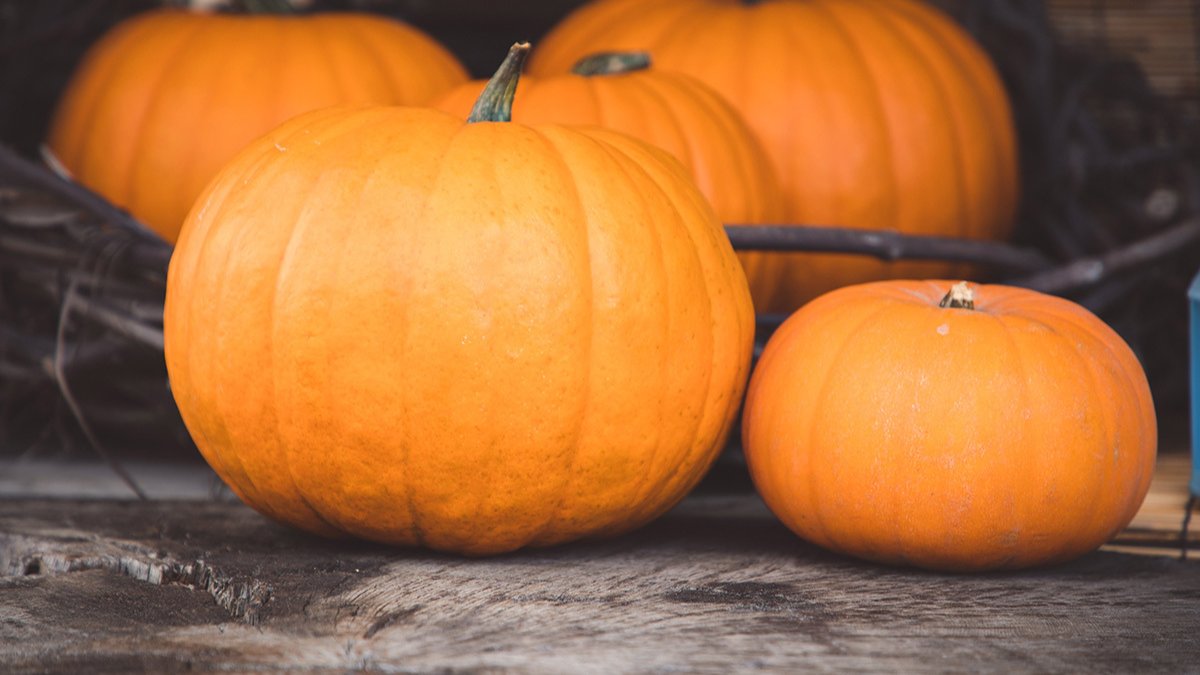On 26 October, Alevtina Argunova, the education minister for the Siberian region of Yakutia, wrote an open letter that called for Halloween to be replaced with “events aimed at preserving and strengthening moral values”, adding that it was “inappropriate” to celebrate the Western holiday “in light of recent events”.
Argunova is not the only official who has attempted to cancel the holiday. Several Russian schools have tried to replace Halloween with a new, ostensibly more Slavic holiday, which they are calling “Pumpkin Feast of the Saviour”, a reference to three late-summer Orthodox holidays, called Apple Feast of the Saviour, Honey Feast of the Saviour, and Nut Feast of the Saviour. Although the Russian fight against Western holidays has been ongoing for nearly a decade, authorities have doubled down on the issue in recent years.
Administrators at a school in Izhevsk in western Russia announced on the school’s social media that “Pumpkin Feast” would be celebrated this year instead of Halloween. The post informed pupils that “costumes of evil spirits” would not be allowed at the festivities. However, at the last minute the school’s leadership cancelled its proxy celebration altogether, and settled for a “pumpkin festival” themed day.
As early as 2018, the Orthodox Human Rights Analysis Centre, based in Moscow, demanded Halloween be abolished in Russia. “We cannot let the celebration of an occult holiday – with symbols that are clearly aggressive, fear-mongering, and Satanic – become a tradition in Russia,” it wrote. “It is still more unacceptable [for schools] to include it in their educational programmes. This is a crime against childhood and the family!”
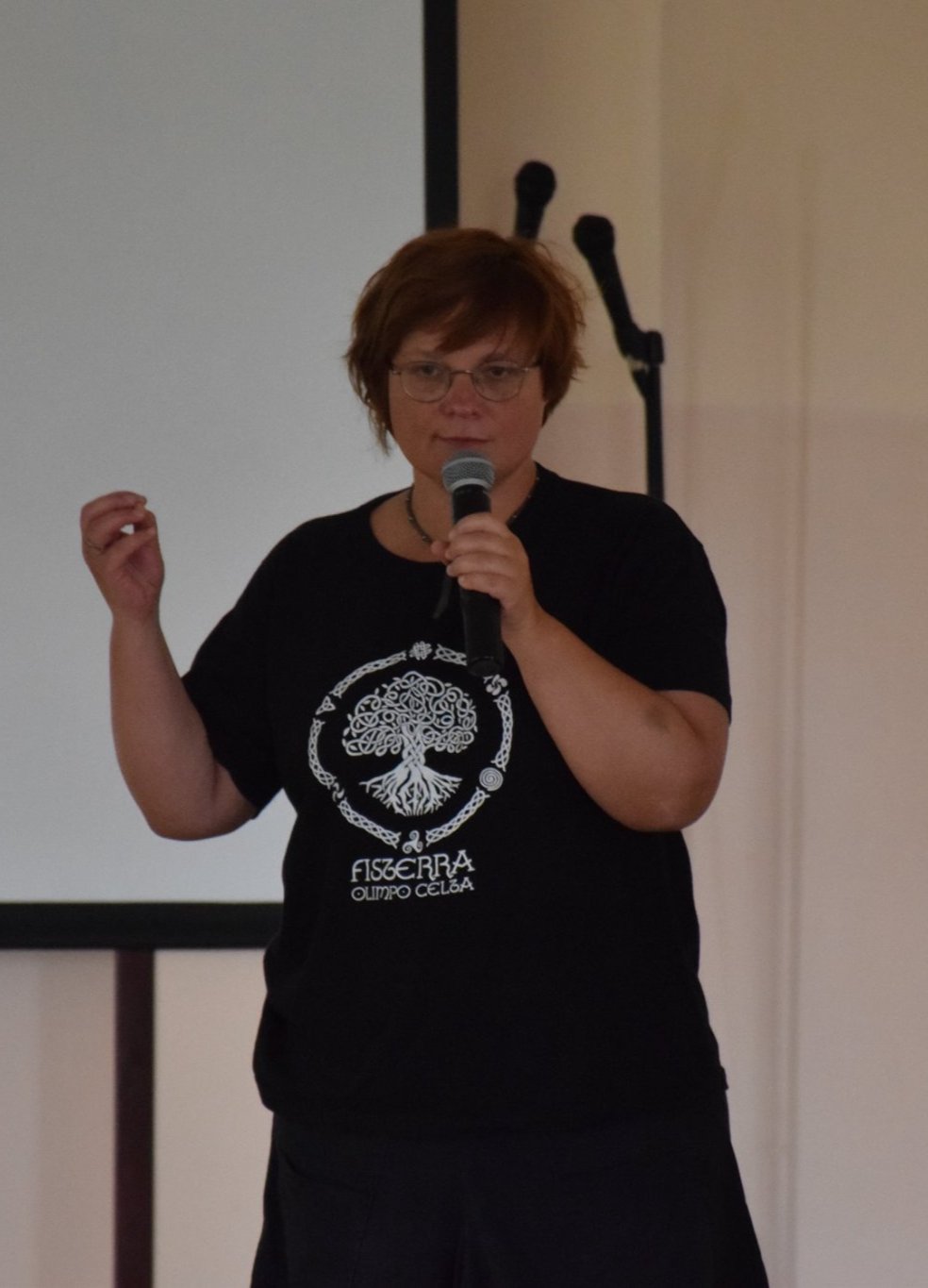
Alexandra Arkhipova. Photo: Facebook
Social anthropologist and folklorist Alexandra Arkhipova has conducted her own small study of Russian attempts to cancel Halloween. Using data gathered from the websites of every Russian media outlet that hasn’t been branded a “foreign agent”, Arkhipova found that efforts to replace Halloween with “our own holiday” began around 2016.
“At first, the proposed replacement was Veles night. On the night between 31 October and 1 November, ancient Slavs would celebrate the change of seasons, when the god Veles would open the gate to other worlds,” she told Novaya-Europe.
Talk of a specific “Pumpkin Feast of the Saviour Day” began last year, after which the holiday was hastily thrown together and the media began to promote it as an authentic Slavic holiday.
Arkhipova offers her own favourite example: “the official news agency in Krasnoyarsk explained that [on this day] ‘an enormous pumpkin was brought to St. Vladimir by Byzantine monks.’” The truth, of course, is that there was never any kind of “Pumpkin Feast day” in Orthodox religious culture, Arkhipova says.
Cultural isolationism
Halloween first appeared in Russia in the late 1990s and early 2000s, gaining gradual popularity. Sociologist Victor Vakhshtayn recalls that in those days it was a generational marker, even coming to represent intergenerational tensions. “In the late 90s, [celebrating] the holiday was a sign of belonging to a new progressive generation,” he said. It was part of the movement to import and adopt everything “related to Western culture.”
In Arkhipova’s opinion, efforts to shun Western holidays are aimed at severing those ties. “It’s a policy of cultural isolationism,” she says, “a way of saying, ‘We don’t need any of your Western things; we have our own. We shouldn’t have holidays that connect us to foreigners, we should only have holidays that connect us with one another. That’s why they’re trying to market Pumpkin Feast day as an ancient, pan-Slavic holiday – to unite the Slavs. You hear about the ‘Slavic world’ all the time – it’s very important.”
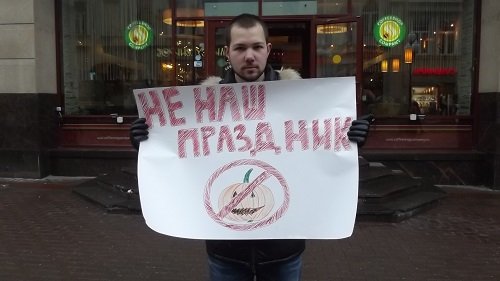
“Not our holiday!”: a man holding up an anti-Halloween sign. Photo: pravoz.ru
She notes that this type of ban often gains traction in Siberia and the Urals, something she suggests could be down to a stronger desire to find a unique identity in these regions compared with European Russia.
Nonetheless, Arkhipova believes that replacing Halloween with a homegrown holiday won’t be an easy task and will require a lot of time and effort. “If we had full-fledged totalitarianism now, then kids in school would be knitting socks and drawing postcards for soldiers,” she said. “Instead we have a kind of partial totalitarianism, information totalitarianism. So, yes, the message comes that everyone needs to knit socks. Ten children start knitting; but then 20 don’t come to class at all. The same is true for pumpkin feast day – it’s superficial, on the surface. The rhetoric about Slavic unity is only for show.”
The war on Halloween is not directly connected to the war in Ukraine, according to Vakhshayn, who says that the drive to crack down on these things predates Russia’s invasion of its neighbour.
“It would be incorrect to say that the drones flew in and then immediately they decided to outlaw pumpkins.”
“Why Pumpkin Feast day, in this case? Well, if you can’t keep people from celebrating a holiday, you just rename it!” He called Pumpkin Feast day an example of “excellent reframing.” However, he said, “the politics of symbolism has been going on for a long time. Yes, it’s reached a suffocating scale, but when you consider all the other repressions — real, and not just symbolic — this is not a crucial issue.
No pumpkins in schools
For Dima Zicer, educator and founder of the Institute of Informal Education, which he set up in 2005 to encourage alternative methods of learning, the cancellation of Halloween clearly fits a larger pattern. “You could make a long list of everything they’ve cancelled, starting with freedom, in the broadest sense of the word, and history, if we’re talking about the edited history textbooks.”
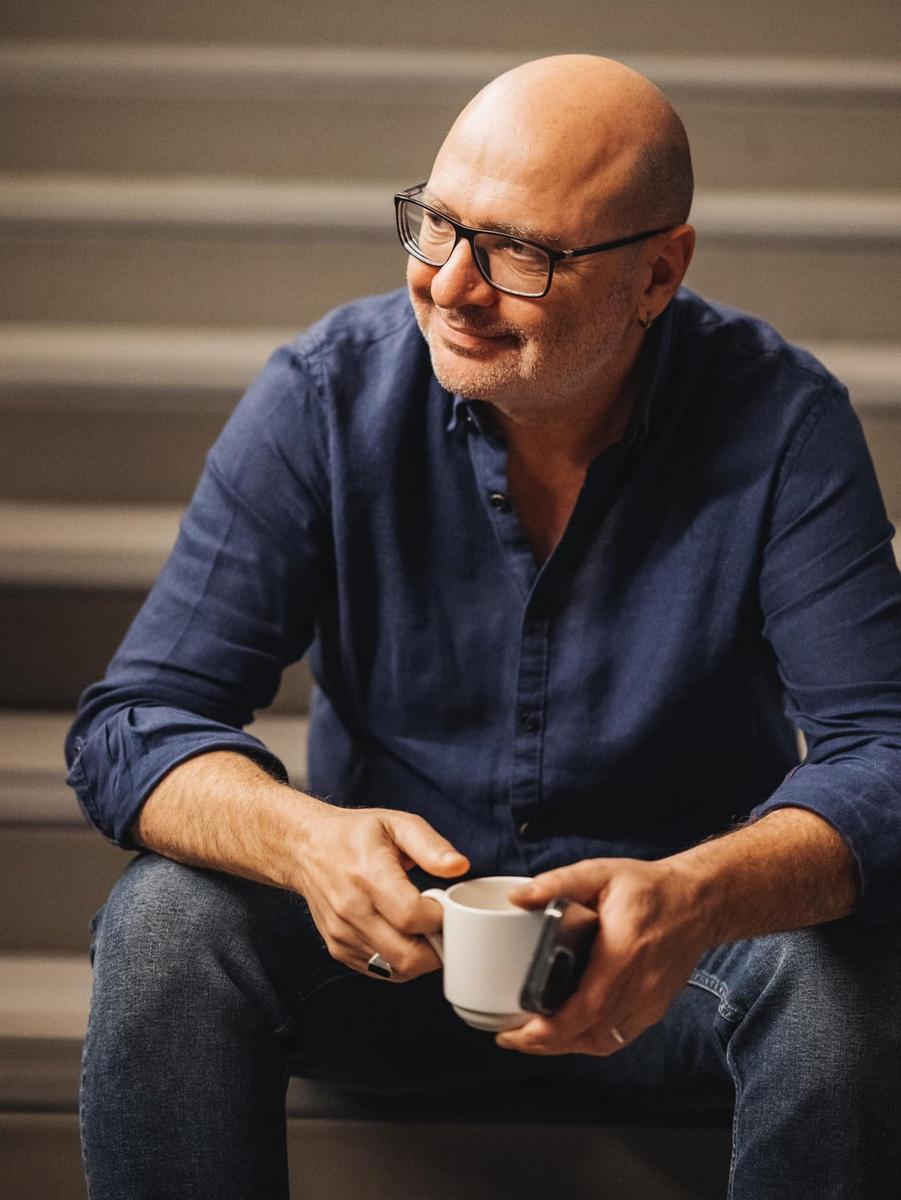
Dima Zicer. Photo: Facebook
Zicer doesn’t think the cancellation of Halloween will be especially catastrophic for children. “There’s nothing really terrible about it; kids will just lose an opportunity to have fun.” Still, he himself thinks Halloween is valuable. “Any holiday that offers people a chance to be creative and have fun, any kind of carnival, is wonderful,” he says, adding that Halloween costumes allow people to “analyse their fears and laugh at them.” He accepts that this view is probably too sophisticated for the higher-ups at the Ministry of Education, though. “Apparently they think Halloween will turn kids into demons. What am I supposed to say to that?”
Ivan Bogantsev, the former headmaster of the European Gymnasium, an international school in Moscow, agrees with Zicer that banning Halloween won’t affect children too much and will, at most, dampen their spirits and confirm the idea that school is no fun. But the drive to cancel holidays itself is symptomatic of wider problems in the Russian education system, he adds. “Teachers earn no money, classes are overcrowded, in some small schools there are literally no teachers, and yet education officials are spending their time writing letters about Halloween.”
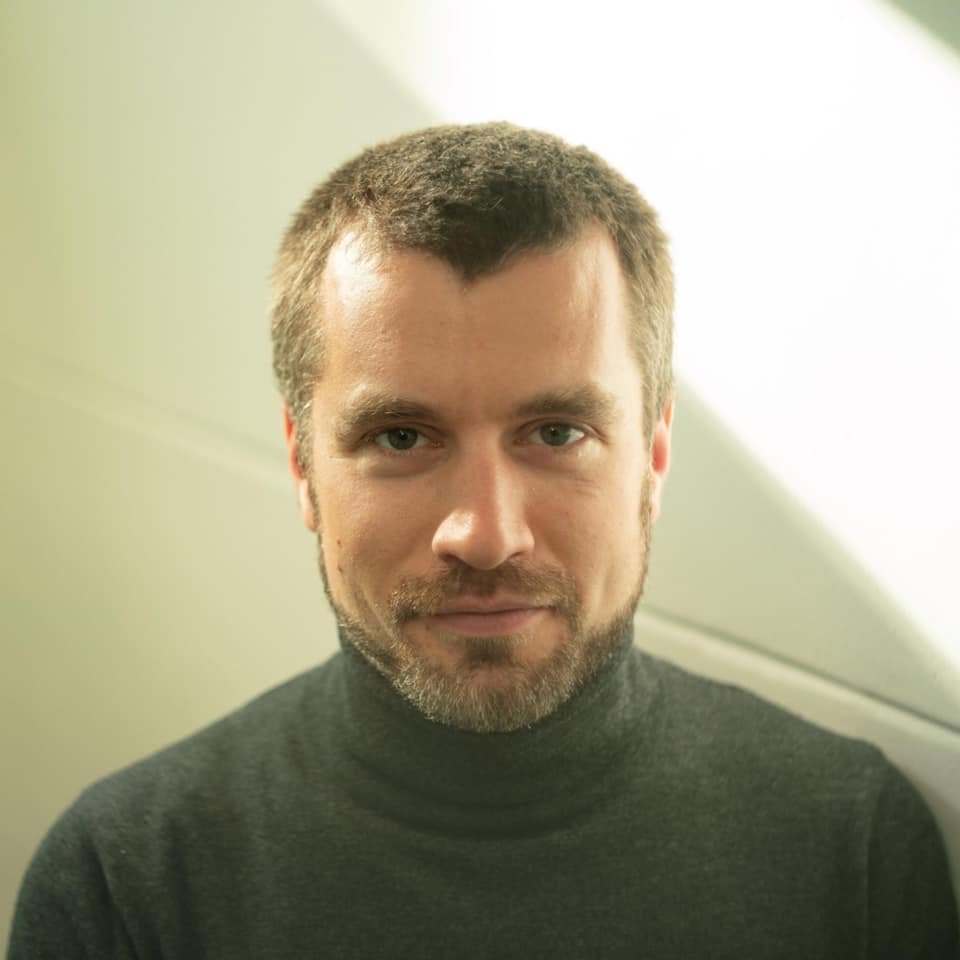
Ivan Bogantsev. Photo: Facebook
In Arkhipova’s view, cancelling Halloween will take a toll on children socially. “There is no variety or range in the Russian education system,” she says. “It’s not like in European and American schools, where there’s always some entertainment … There are no holidays to break up the long autumn semester. Halloween was the one thing that kids awaited with excitement. But it seems the authorities are even trying to take that away.”
Join us in rebuilding Novaya Gazeta Europe
The Russian government has banned independent media. We were forced to leave our country in order to keep doing our job, telling our readers about what is going on Russia, Ukraine and Europe.
We will continue fighting against warfare and dictatorship. We believe that freedom of speech is the most efficient antidote against tyranny. Support us financially to help us fight for peace and freedom.
By clicking the Support button, you agree to the processing of your personal data.
To cancel a regular donation, please write to [email protected]
